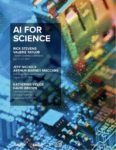NERSC is inviting proposals for projects that will leverage NERSC’s Perlmutter supercomputer to push the state of the art in Generative AI (GenAI) and deep learning for science and produce novel science outcomes. We are specifically seeking teams with expertise using deep learning for science, a deep understanding of the scientific domain, and demonstrated proofs-of-concept. NERSC staff […]
NERSC Call for Proposals: Generative AI for Science, April 1 Deadline
HPC News Bytes 20230918: New AMD CPUs and Intel FPGAs, Arm’s IPO and Strategic Pivot, AI for Science
A happy mid-September morning to you. Here’s a hop (4:54) through recent HPC news, including: AMD launches EPYC 8004 CPUs for energy- and space-constrained workloads; Intel announces FPGAs going into its Innovation 2023 event; Arm’s successful IPO and strategic pivot; a report on AI for science….
Livermore Lab Team Boosts Trust in AI for Science by Making Machine Learning Explainable
As machine learning techniques become increasingly used in the sciences, a team of researchers in Lawrence Livermore National Laboratory’s Computing and Physical and Life Sciences directorates are trying to provide a reasonable starting place for scientists who want to apply machine learning but lack a strong ML background. The goal is to help users understand […]
HPE to Build 67 PFLOPS TSUBAME4.0 HPC for AI-Driven Science at Tokyo Tech
TOKYO – May 19, 2023 – Hewlett Packard Enterprise (NYSE: HPE) today announced that it was selected by Tokyo Institute of Technology (Tokyo Tech) Global Scientific Information and Computing Center (GSIC) to build its next-generation supercomputer, TSUBAME4.0, to accelerate AI-driven scientific discovery in medicine, materials science, climate research, and turbulence in urban environments. TSUBAME4.0 will be built using HPE […]
Proposals Open to Research Community for ALCF AI Testbed’s Cerebras and SambaNova Systems
Proposals are now being accepted by the Argonne Leadership Computing Facility for access to its AI Testbed, a collection of advanced artificial intelligence accelerators available for science. Researchers interested in using the AI Testbed’s Cerebras CS-2 and SambaNova DataScale systems can submit project proposals via the ALCF’s Director’s Discretionary program. Access to additional testbed resources, including Graphcore, Groq, and Habana accelerators, will be […]
@HPCpodcast: Argonne’s Rick Stevens on AI for Science (Part 2) – Coming Breakthroughs, Ethics and the Replacement of Scientists by Robots
In part 2 of our not-to-be-missed @HPCpodcast with Argonne National Laboratory Associate Director Rick Stevens, he discusses some of the important advances that had, by 2015, likely ended the cycle of AI for science winters. He also delves into the major challenges in AI for science, such as building models that are transparent and unbiased while also robust and secure. And Stevens looks at important upcoming AI for science breakthrough use cases, including the welcome news – for researchers beset by mountains of scientific papers – of utilizing large natural language modeling to ingest and collate existing knowledge of a scientific problem, enabling analysis of the literature that, Stevens said, goes well beyond a Google search….
@HPCpodcast: Argonne’s Rick Stevens Surveys Trends and Technologies Driving AI for Science — Part 1
If HPC had a band of rock stars, Rick Stevens might well be lead guitarist and do the vocals. The associate lab director and Exascale Computing Initiative leader at Argonne National Lab (and professor at the University of Chicago) has one of the most impressive records of sustained achievement in the HPC community. Here, in part one of a two-part episode of the @HPCpodcast, Stevens takes up the topic of AI is changing the face of science from the points of view of a scientist and a computer scientist.
Podcast: AI for Science
In this podcast, the Radio Free HPC team looks at the AI for Science program coming out of Argonne National Laboratory. “This is one of the biggest potential changes in our industry and well worth the investigation. But figuring out where AI fits into the traditional world of research and simulation is a difficult problem. Henry points out that nearly every grant proposal needs to include ‘AI’ in order to get serious consideration.”
Argonne Publishes AI for Science Report
Argonne National Lab has published a comprehensive AI for Science Report based on a series of Town Hall meetings held in 2019. Hosted by Argonne, Oak Ridge, and Berkeley National Laboratories, the four town hall meetings were attended by more than 1,000 U.S. scientists and engineers. The goal of the town hall series was to examine scientific opportunities in the areas of artificial intelligence (AI), Big Data, and high-performance computing (HPC) in the next decade, and to capture the big ideas, grand challenges, and next steps to realizing these opportunities.











